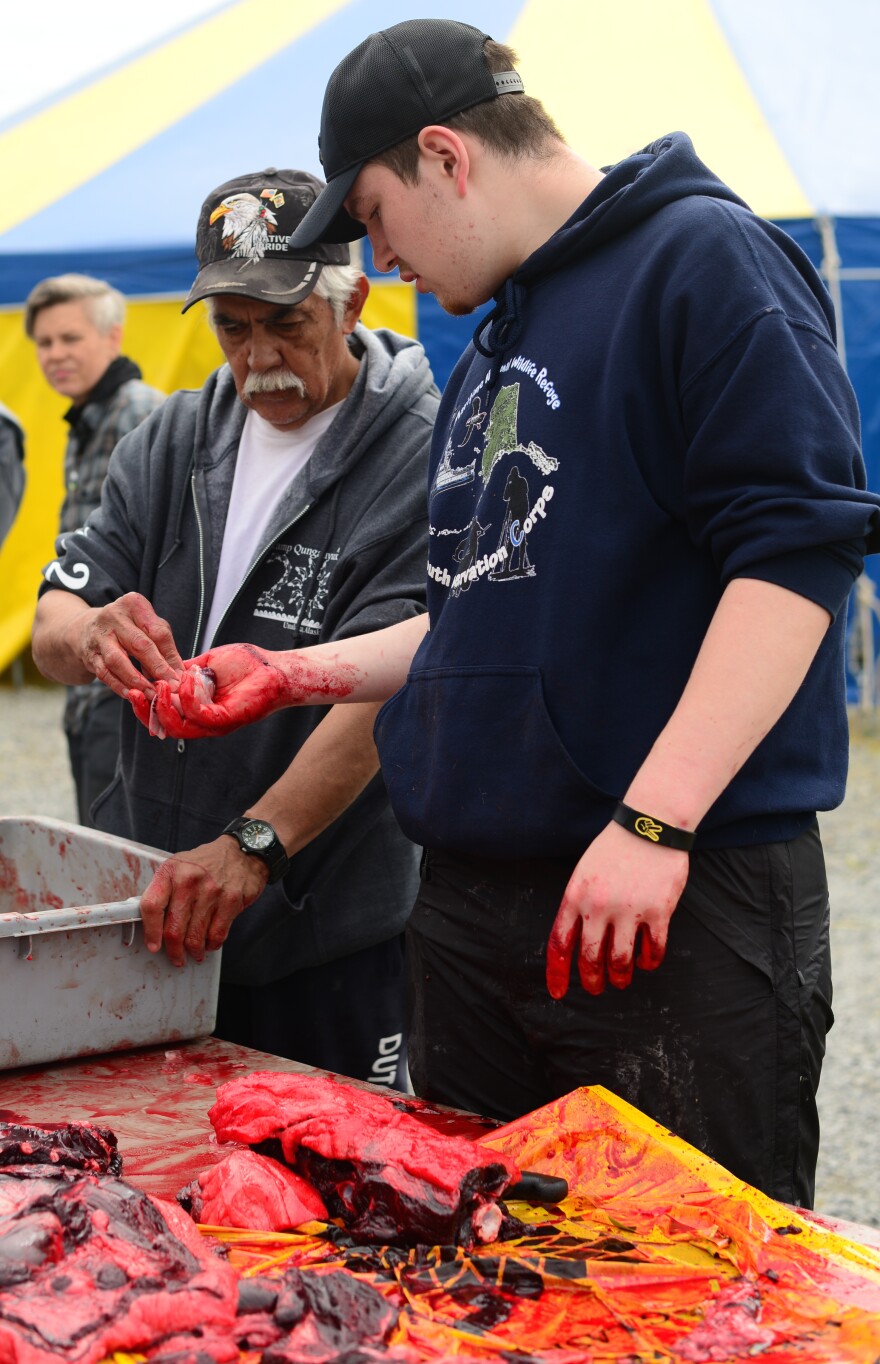Unalaska's Camp Qungaayux celebrated its twentieth anniversary this year.
KUCB's Laura Kraegel has the story from Humpy Cove, where the Qawalangin Tribe is already looking ahead to the next 20 years.
It's a clear day at Humpy Cove, and dozens of kids are chattering along the shore. Their careful eyes are trained on the water.
"Bring those kids over here!" says Vince Tutiakoff Sr.
He calls for everyone to gather round as they finally glimpse the source of their excitement. It's a hunting party, returning with a seal.
"Today, we've got a hair seal," says Tutiakoff. "It's called isux. Say, 'Isux!'"
"Isux!" the kids repeat.

Tutiakoff is the coordinator of Camp Qungaayux, organized by the Qawalangin Tribe. He's helped to lead camp for about half its lifetime, ever since Emil Berikoff recruited him almost a decade ago.
"Our mission and goal is pretty much [the same] from day one," he says. "And that's the Aleut and Unangan culture, language, and knowledge of the elders being passed down to the kids."
Now that he's nearing retirement, Tutiakoff says he's ready to pass down some responsibility too. He's already got an eye on the next generation of leaders.
"I look around and I see mentors today that were 5- and 10-year-olds [at previous camps]," he says. "Now, they're teachers."

That includes Dolores Gregory, who's just a ways down the beach. She's teaching a group of kids to stick the final move of Chagix, the halibut dance.
Gregory says the Atka dance tells the story of a successful halibut fishing trip. It's been taught every summer since the first Camp Q, when she was six years old.
"I was actually too little to come when they first started," she says. "So I'd be over in the river catching minnows while all my cousins and my brother were in camp."
Gregory has come a long way since then. As an adult, she's grown into an established dancer and a strong advocate for preserving Unangax̂ stories.
"A majority of our stories were passed down through dance, so that part of passing culture along and keeping it alive is really important," she says. "Because dancing was actually forgotten. It was lost."

Gregory is proud to help revive the tradition as an emerging camp leader. As she watches her students dance on the beach, finally having mastered Chagix, she says she's excited for the future.
"I would love to see the kids that I've taught take up the torch themselves," she says. "I can see that happening with some of the girls in my dance group now."
Meanwhile, back on the other side of camp, the hunting party has hauled the seal onto a butchering table.
Trever Schliebe takes a newly sharpened knife and gets to work.

"You just chop off the head, cut straight down the middle of the body, and peel it back," he says.
Schliebe is 17 years old. He's the hunter who shot the seal.
"It's kind of my first year stepping up a little bit more," he says. "Being a little bit more serious."
That includes practicing his processing skills and helping to demonstrate for the younger kids. He's learning from experienced hunters like Larry Dirks.
"Go like this on the soft spot here," says Dirks, showing Schliebe how to navigate around a tendon. "Take it and bend it. Then you'll see where you can cut."
Schliebe listens carefully, even though he doesn't cut as much as Dirks and the other hunters.
"I'm still trying to learn everything they know," he says. "It's coming along, but I know there are more tricks they'll teach me later."
That's something like a childhood wish come true for Schliebe. He's gone to Camp Q since the fourth grade.
"When it came to seal or sea lion day, I was always excited," he says. "I wanted to get in, get up close, and touch something. Now, I'm shooting them and cutting them up, and it's pretty cool."

Tutiakoff isn't ready to hand the reins to Schliebe or Gregory quite yet. But he says Unalaska's up-and-coming cultural leaders have him feeling confident about the next era of Camp Q.
"I really feel good about leaving it in good hands, if I should decide to retire," he says. "I've been trying to retire for a couple of years, so I'm hoping they'll continue what we have going on here today."
And does he see a long future for Camp Q?
"Yes," he says. "As long as there's Aleut in this community, there'll be a culture camp. I really believe that."
A new exhibit on Camp Qungaayux opens Friday, Dec. 8. The Museum of the Aleutians is hosting a free reception from 6 to 8 p.m., when community members can check out the photographs, videos, and artifacts on display. The exhibit, co-curated by Unalaska Community Broadcasting, will be open until March 1.







